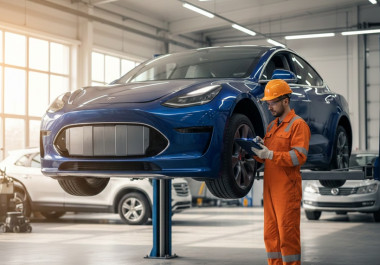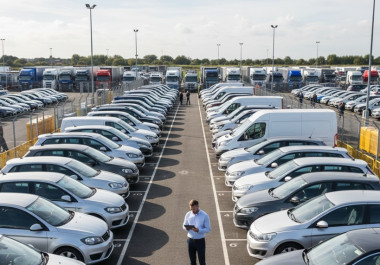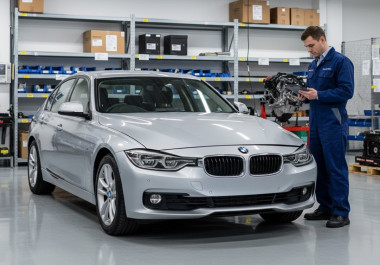For years, the car auction game was all about instinct. A good dealer could walk a line of cars, kick a few tyres, listen to an engine, and just know what a vehicle was worth. It was an art, a skill you learned over decades. That human touch is still absolutely vital, but now it’s got a new mate: technology.
Behind the scenes, the modern auction is going through a massive change. Artificial intelligence (AI) and "big data" are quietly reshaping every part of the business. These aren't just fancy terms; they're powerful tools making auctions fairer and more accurate. For platforms like RAW2K, this tech is the engine under the bonnet, making the whole thing run smoother for everyone.
For the average person trying to buy or sell a car, it all boils down to one thing: less guesswork and a lot more confidence.
So, What Is This "Big Data" Malarkey?
Think of big data as giving one expert the combined memory of a thousand dealers.
A seasoned trader might remember that a three-year-old Ford Focus with a dented wing sold for about nine grand last week. A computer running on big data remembers the final prices of pretty much every Ford Fiesta sold in the last five years, knowing its mileage, colour, number of previous owners, and condition at the time of sale. It knows what that Focus is worth in Aberdeen on a rainy Tuesday and in Bristol on a sunny Friday.
AI in car auctions is the brain that makes sense of all that information. It spots patterns a human could never see, like how the value of convertibles creeps up by about 8% between March and June, or how a factory-fitted tow bar on a Ford Transit consistently adds a good £250-£300 to its auction value. It’s not about replacing the expert; it’s about making the expert even better.
Sharper Prices for Buyers and Sellers
The first place this tech really makes a difference is in pricing a vehicle. Getting the valuation right is key to a good auction, and AI has made this more of a science.
How It Works
When a car is listed for one of the vehicle auctions, a smart system doesn't just see the make and model. It looks at dozens of details:
-
The Car's Spec: Engine size (1.0 vs 1.6 litre), trim level (Zetec vs Titanium), and any desirable extras like a panoramic sunroof.
-
Its History: Mileage, number of previous keepers, and the service record (main dealer or local garage).
-
Its Condition: Specific damage reports, tyre tread depth, and even its MOT advisory history. A car with the same advisories year after year will be valued lower.
-
Market Trends: What have similar cars sold for in the last seven days? It also tracks real-time demand for that specific model.
-
Outside Factors: Even things like recent changes to ULEZ zones can instantly affect the value of older diesel cars in certain areas.
By weighing all these factors, the system comes up with a valuation that often lands surprisingly close to the final hammer price. This helps the seller set a realistic reserve and gives buyers a solid idea of what the car is truly worth.
A Fairer Game: Spotting the Chancers
One of the biggest worries for auction newcomers is the thought of being had over. In the past, things like "shill bidding"—where a seller's mates bid on their car to push the price up—could be tricky to spot.
This is where AI in car auctions acts as a silent lookout. The system watches bidding patterns across thousands of sales. It learns what normal bidding looks like and can instantly flag behaviour that seems a bit off. For instance, it might spot:
-
An account that has bid on 15 cars from the same seller in a month but has never actually won one.
-
A bidder who consistently places one high bid early on and then vanishes, a tactic sometimes used to set a fake high starting point.
-
Two accounts that always seem to be the last two bidders on a particular seller's cars, which might suggest they're working together.
When the system raises a red flag, the team can take a closer look. It’s a powerful way to keep the auctions straight and make sure every winning bid is a fair one.
Gut Feeling Meets Smart Data: A Story from the Floor
But for all this clever tech, you can't beat a pair of experienced eyes. A great auction is a mix of both.
Take the case of a slightly tired-looking Land Rover Defender that came up for sale. On paper, the data wasn't great. It had high mileage (150,000+ miles) and a patchy service history. The AI-generated valuation was modest, around £12,000.
But the auction manager, an old hand, saw something the data couldn't. He spotted a rare factory-fitted winch and a galvanised chassis—details only a proper enthusiast would value. He knew there was a specialist market for a vehicle just like it.
He advised the seller to set a slightly higher reserve of £14,000. During the auction, he made sure to highlight these features. The bidding flew past the AI's estimate. Two passionate collectors got into a bidding war, and it eventually sold for over £17,000. The data provided the starting point, but the human expert knew where the hidden value was. That’s how it should work.
So, How Does This Tech Actually Help You?
How does all this clever technology help someone looking to buy or sell?
For Buyers
-
More Trust: You can bid with more confidence, knowing the prices are based on real data and that someone is watching for funny business.
-
Better Information: AI can help create smarter listings. For example, if a 2017 VW Golf is listed, and data shows that models from that year often have water pump issues around 80,000 miles, the system might prompt the seller: "Please confirm the status of the water pump and timing belt."
-
Personalised Nudges: The system can learn what you’re after. If you regularly bid on van auctions, it can let you know when a vehicle that fits your profile is listed.
For Sellers
-
Smarter Reserves: You can set a reserve price with confidence, backed by tons of real sales data. This reduces the risk of your car not selling.
-
Better Timing: Data can show the best time to sell a certain type of vehicle. For example, demand for motorcycle auctions always picks up by 15-20% in the months leading up to summer.
-
Wider Reach: By looking at buyer data, the platform can help market a vehicle to the people most likely to be interested in it.
Final Thoughts: A Smarter Way to Do Business
Relying purely on gut feeling is becoming a thing of the past. The arrival of AI in car auctions and big data has brought a new level of intelligence and fairness to the business. It hasn't taken away the buzz of the bid or the satisfaction of finding a bargain; it has simply backed it all up with a foundation of solid data.
This allows platforms like RAW2K to offer a more transparent and trustworthy experience. The human touch is still essential, but when it’s combined with smart technology, you get a better auction for everyone.




